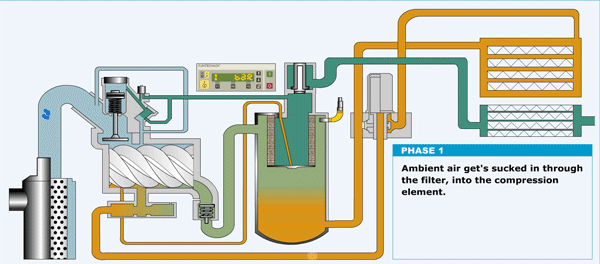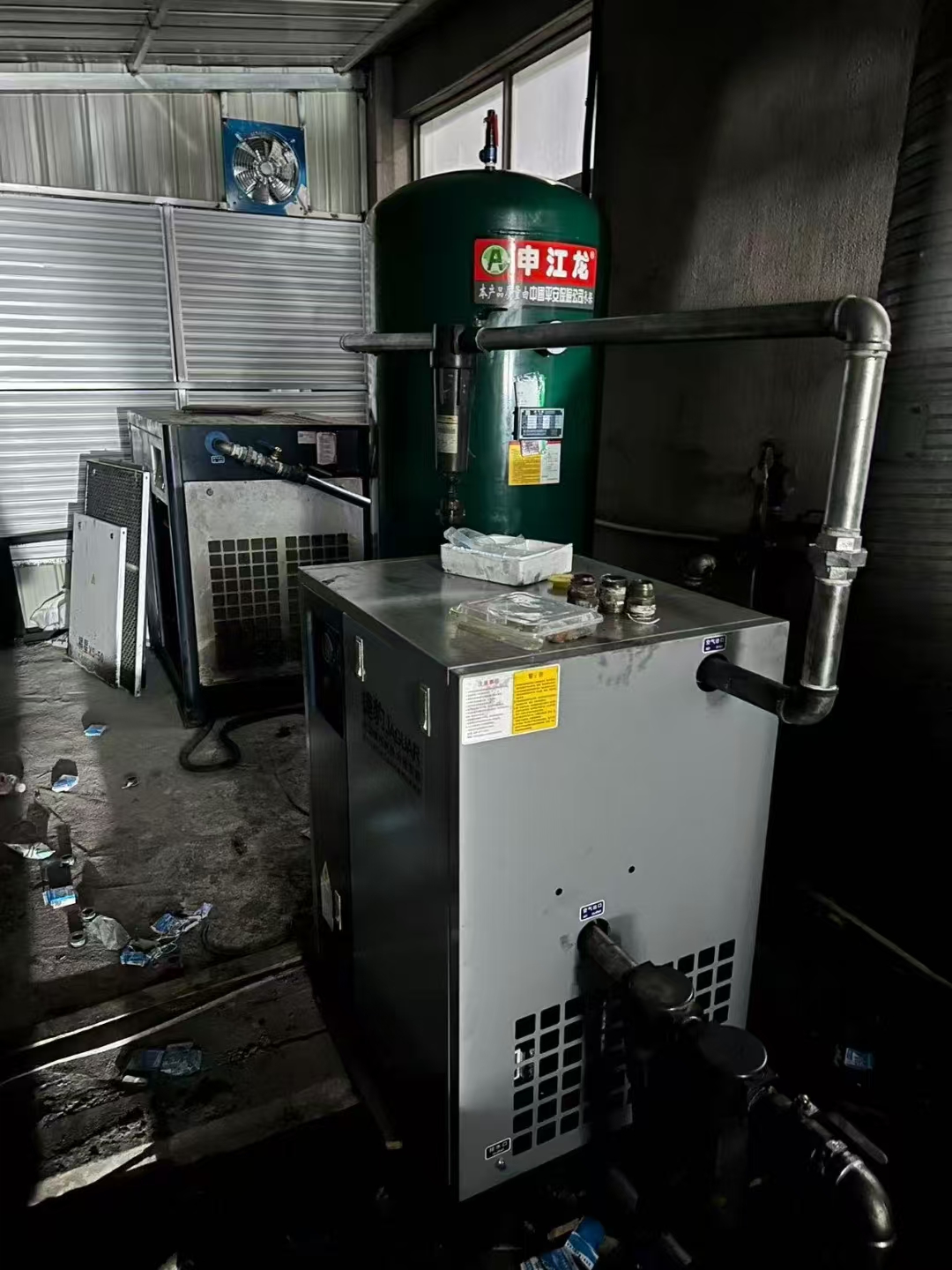Understanding Screw Air Compressors
A screw air compressor usually consists of two main rotors that trap air between them, compressing it as they rotate. This type of compressor doesn’t have valves or other mechanical forces that cause unbalance, making them durable and able to run at high speeds.
The main components include the air-end, oil separator, oil filter, and cooling system. The air-end is where the actual compression happens. The oil separator ensures that the compressed air is free from oil, while the oil filter keeps the system clean.
The cooling system helps maintain optimal operation temperature, preventing overheating which can cause problems like high exhaust temperatures.
Role in Industrial Production
In industrial production, screw air compressors are used across various applications, from powering pneumatic tools to bulk material handling. They offer a constant flow of compressed air, which is crucial for processes that require consistent pressure.
Their design allows them to function efficiently in harsh environments. This makes them a preferred choice for industries like automotive, manufacturing, and food processing. The constant pressure and reliability they provide help maintain productivity on production lines and enable complex operations smoothly.
Factors Leading to High Exhaust Temperature

High exhaust temperature in a screw air compressor can cause decreased efficiency and potential damage if not addressed.
High Ambient Temperature
When the temperature around your compressor rises, the machine can struggle to cool down effectively. High ambient temperatures can lead to an increase in the exhaust temperature, causing strain on the system. It’s crucial to monitor your compressor’s environment, especially during hot seasons, to maintain optimal performance.
Increasing ventilation or using a cooling system to regulate the surrounding temperature might help. Placing the compressor in a well-ventilated area may prevent overheating. Cooling measures, such as fans or air conditioning units, can help control the ambient temperature and protect the compressor.
Cooling System Efficacy
If the cooling system is not effective, it can lead to high temperatures and reduced performance. Check the cooling components regularly to ensure they function correctly.
Blocked vents, dirty filters, or malfunctioning fans can reduce the cooling effect. Cleaning and maintaining these parts will improve efficiency.
Lubrication Quality and Levels
Proper lubrication is key to preventing overheating. Low oil levels or poor-quality lubricating oil can elevate the exhaust temperature. High temperatures break down oil faster, leading to poor performance and potential equipment wear.
Critical Components Affecting Temperature
Temperature Control Valve Usage
It adjusts the flow of oil to either warm or cool the system as needed. If the valve core or valve body is faulty, it might not function properly, leading to temperature issues.
Efficiency of the Oil Cooler
It reduces the likelihood of overheating by efficiently cooling down the circulating oil. A poorly functioning oil cooler can cause the compressor to run hot.
Condition of the Oil Separator
A clogged or damaged oil separator can lead to increased temperatures and reduce compressor efficiency.
Operational Practices and Maintenance
To manage high exhaust temperatures in screw air compressors, focus on regular maintenance, quick repairs, and maintaining a suitable operating environment.
Adhering to Regular Maintenance
Start by checking oil levels frequently. Ensure that the oil is clean and topped up, as this ensures smooth operation and prevents overheating.
Inspect filters, like the oil filter and air filter, for any blockages or dirt buildup. A clogged filter reduces efficiency and increases exhaust temperature. Make it a habit to replace them as needed.
Prompt Troubleshooting and Repairs

If you notice unusual temperature readings, investigate right away. Look into common faults, such as a faulty temperature control valve or an oil supply issue, which can cause overheating.
Having a maintenance service team or a knowledgeable technician on hand can make a huge difference. They can identify problems swiftly and make necessary repairs or replacements. Record any troubleshooting steps and repairs as part of your routine maintenance log.
Being proactive in fixing issues reduces the likelihood of repeated faults and extends the lifespan of your equipment. Pay close attention to performance indicators to know when your air compressor might need professional attention.
Ensuring Ideal Operating Environment
Ensure there is ample airflow in the air compressor room to prevent heat accumulation.
Position the compressor away from walls and other machines to ensure good air circulation. This helps maintain a stable temperature and optimize performance. Reduce ambient temperature fluctuations by insulating the room if necessary.
Regularly inspect and clean vents or ducts to avoid obstructions. Keeping the operating environment clean will ensure efficient heat dissipation and protect your compressor from overheating.
Symptoms and Consequences of High Exhaust Temperatures
Identifying High Temperature Indicators
When dealing with high exhaust temperatures, you should first watch for abnormal temperature rises on the compressor’s display panel. The exhaust pressure might also increase, indicating a problem.
Pay attention to any unexpected noises, as they can be a sign of the compressor working harder than usual. Another indicator is a gradual loss of operating efficiency, such as longer cycles and reduced air output. Over time, increased wear and tear could become noticeable on the machine.
Because compressors vary, regular checks using temperature sensors can help you keep track of temperature changes. Taking readings outside of the normal range can point you towards a potential issue before it worsens.
Implications of Overheating
High exhaust temperature can damage essential components like seals and bearings, leading to expensive repairs. Overheating can even result in air leaks, further increasing energy costs.
Excessive heat may also cause the compressor oil to degrade faster. This can compromise lubrication, making it harder for the compressor to run smoothly. Consequently, you might face frequent servicing to replace burnt-out parts or oils.
Preventive Measures for Temperature Control
Effective Ventilation and Air Circulation
Good ventilation helps keep the compressor at the right temperature. Place your compressor in a space with plenty of airflow. Be sure to keep the vents and air passages clear of dust and debris. This lets air move freely and keeps the machine from getting too hot.
You might also want to use fans or ventilation systems to improve air circulation and remove hot air from around the compressor. By doing this, you’ll help it work better and last longer.
Proper Oil Filter and Oil Quality Management
Using a clean, high-quality oil filter is necessary for good performance. Regularly check and change the oil filter to keep impurities out of the system. Filters can get clogged and cause the machine to heat up if you don’t maintain them well.
High-quality lubricating oil ensures the compressor parts move smoothly. Check the oil return pipe and temperature control valve often to make sure the oil isn’t trapped or lost. Also, the oil shut-off valve should work properly to avoid overheating issues.
